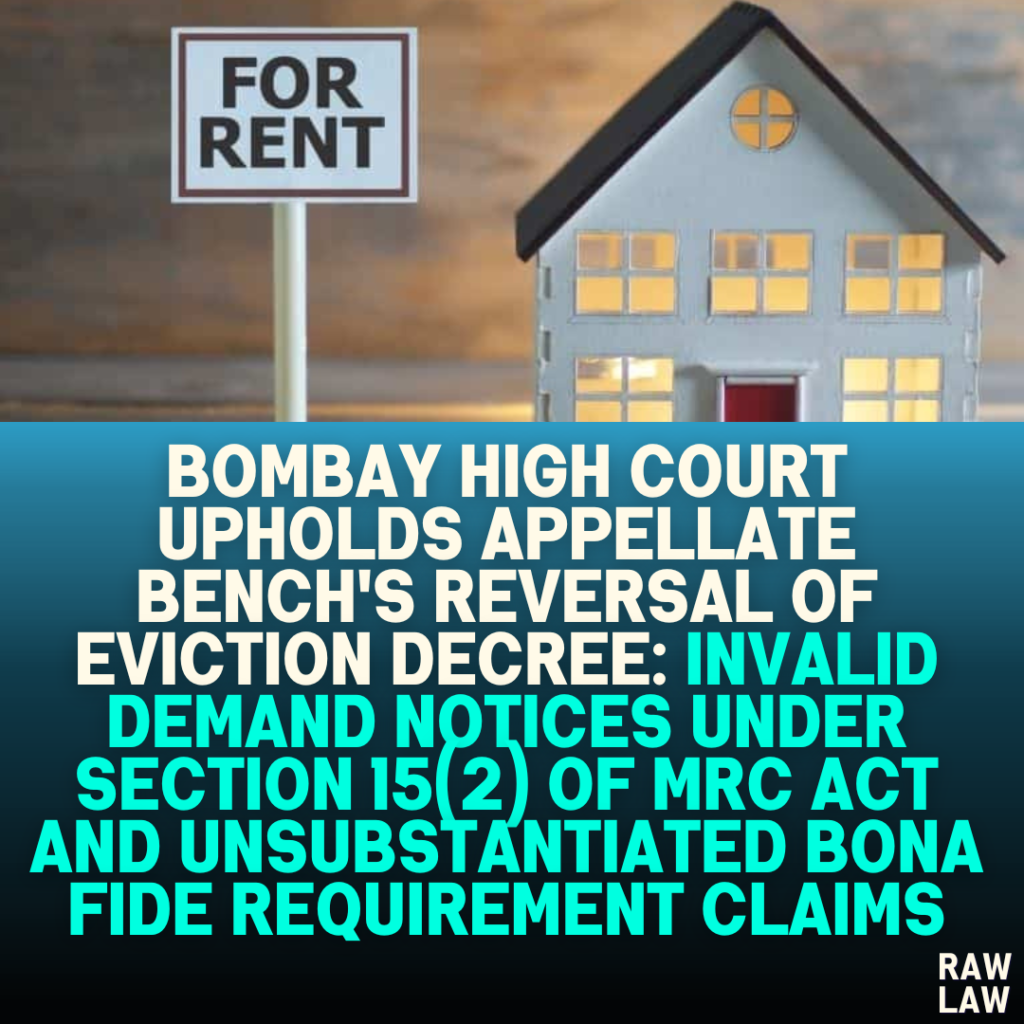Court’s Decision: The Bombay High Court dismissed the Civil Revision Applications challenging the Appellate Bench’s judgment that reversed the eviction decree. The High Court held that neither of the notices served by the landlord constituted a valid demand notice under Section 15(2) of the Maharashtra Rent Control Act, 1999 (MRC Act). As a result, the suit for eviction on the grounds of non-payment of rent was deemed not maintainable. The court also upheld the Appellate Bench’s rejection of the landlord’s claim of bona fide requirement.
Facts: The dispute involved a tenancy agreement dated 19 April 1976, under which the original tenant’s father was leased a shop in Chembur, Mumbai, for ₹100 per month. After the original tenant’s death, the tenant’s son (the respondent in this case) continued occupying the premises, initially running a Kirana Store and later a business making tube light fittings. The landlord (the petitioner) alleged non-payment of rent since March 1996 and served notices in 1997 and 2003 to demand possession, citing breaches of the tenancy agreement and non-payment of rent.
The Small Causes Court decreed eviction on grounds of default in rent and bona fide requirement but rejected the claims of unlawful subletting and unauthorized alterations. Upon appeal, the Appellate Bench reversed this decision, dismissing the eviction decree. The landlord then filed revision applications challenging the Appellate Bench’s ruling.
Issues:
- Whether the notices served by the landlord qualified as valid demand notices under Section 15(2) of the Maharashtra Rent Control Act.
- Whether the Appellate Bench was correct in rejecting the claim of bona fide requirement for eviction.
Petitioner’s Arguments: The petitioner (landlord) argued that the Appellate Bench erred in reversing the eviction decree and claimed that the notices served in 1997 and 2003 constituted valid demand notices under Section 15(2) of the MRC Act. It was argued that the defendant-tenant was in default of rent payment, as even though the rent was deposited in court, it was done irregularly, violating the terms of the Act. The petitioner relied on several precedents, including the Supreme Court’s decision in Rakesh Kumar vs. Hindustan Everest Tool Ltd. and argued that the demand for arrears could be implied from the context of the notices.
Respondent’s Arguments: The respondent (tenant) contended that the notices did not meet the statutory requirements for a demand notice under Section 15(2) of the MRC Act, as they did not specifically demand rent and were addressed to the wrong individual. Additionally, the respondent had been regularly depositing rent in court following an earlier order. The Appellate Bench was correct in rejecting the ground of bona fide requirement, as the petitioner did not provide sufficient evidence to support the claim.
Analysis of the Law: Section 15(2) of the MRC Act requires landlords to serve a written notice demanding rent before initiating eviction proceedings for non-payment. The court emphasized that the law mandates clear communication to tenants regarding their arrears and an opportunity to rectify the default within 90 days. In this case, neither of the notices specified the exact arrears or constituted a proper demand, nor were they addressed to the tenant correctly.
Precedent Analysis: The court considered the Supreme Court’s ruling in Rakesh Kumar vs. Hindustan Everest Tool Ltd., where it was held that a demand for rent could be implied under certain circumstances. However, the High Court distinguished this case from the present one, noting that the notices in question lacked clarity regarding the exact amount of rent owed and were not addressed to the proper party.
Court’s Reasoning: The High Court reasoned that the notices did not meet the statutory requirements under Section 15(2) of the MRC Act. The first notice, dated 13 May 1997, was addressed to the tenant’s brother and did not constitute a valid demand. The second notice, dated 26 March 2003, vaguely mentioned arrears without specifying the amount or providing the tenant an opportunity to rectify the default. The court further held that the claim of bona fide requirement was unsubstantiated, as no evidence was presented regarding the nature of the intended business for which the premises were needed.
Conclusion: The High Court upheld the Appellate Bench’s judgment and dismissed the revision applications. The court found that no valid demand notice was served under Section 15(2) of the MRC Act and that the claim of bona fide requirement was not proven.
Implications: This judgment reinforces the statutory requirement for landlords to serve clear and specific demand notices before seeking eviction for non-payment of rent under the MRC Act. It also highlights the necessity for landlords to provide adequate evidence when making claims of bona fide requirement for eviction.
